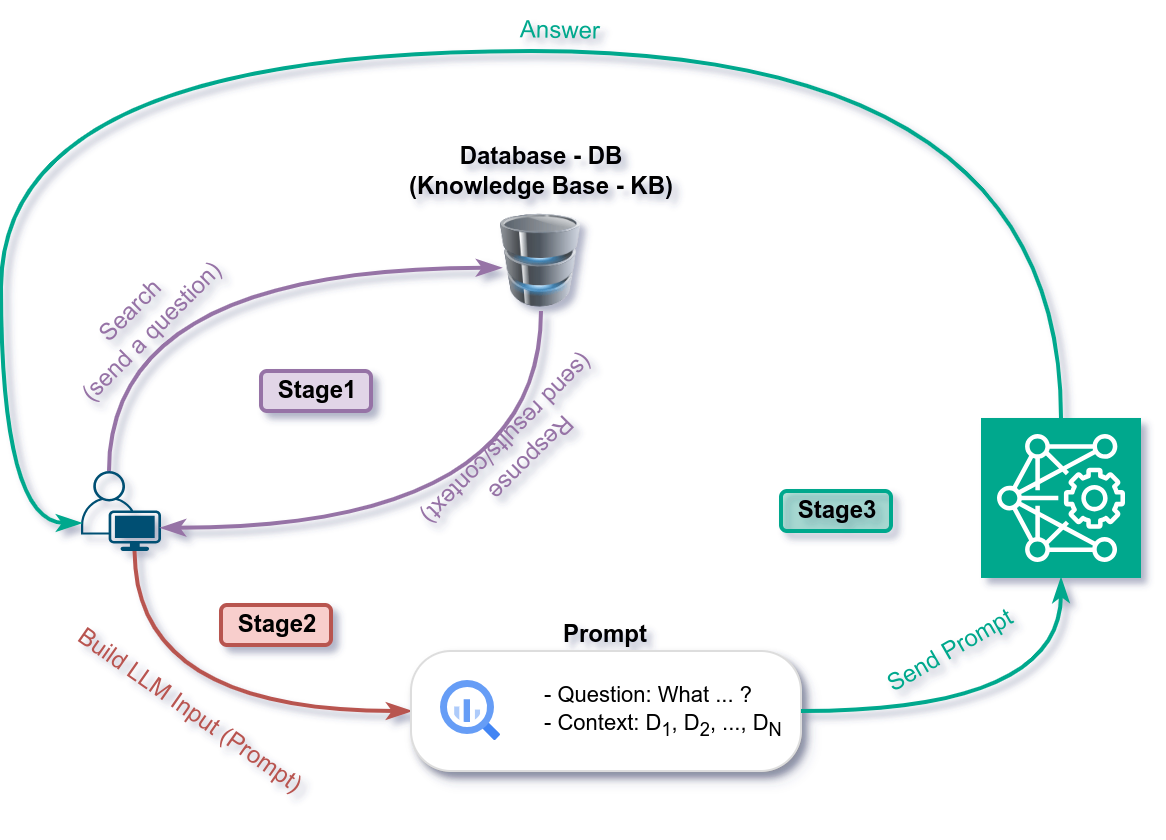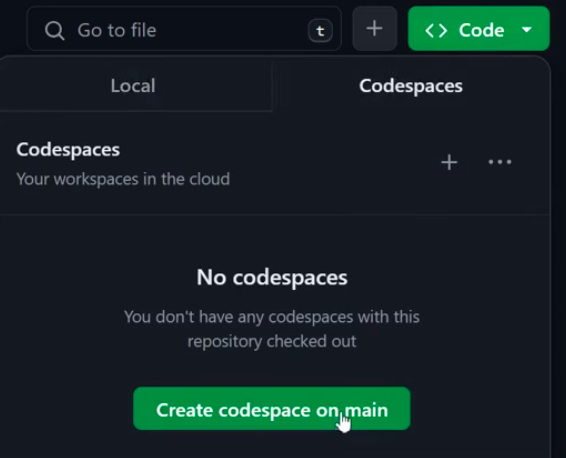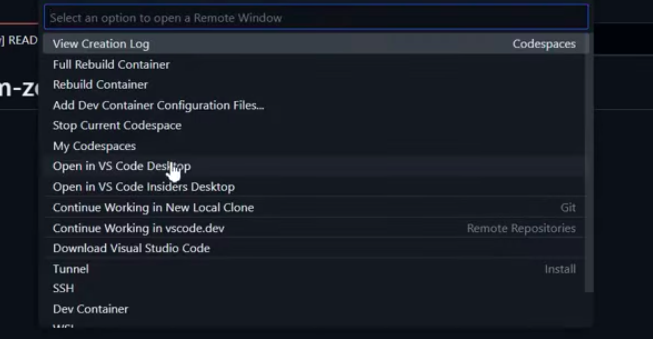[llm-zoomcamp]-intro-01: Introduction to LLMs and RAG
This is my first experience with the RAG system. If there are any errors, whether in terminology, structure, or understanding, …, please inform me.
I will share knowledge that I have learn about the first module in llm-zoomcamp course from DataTalks.Club
In this article I will discus about implementing simple Retrieval Augmented Generation (RAG) pipeline to make a Q&A system. This Q&A system can answer questions about the FAQ Documents from the Zoomcamp courses of DataTalks.Club. This is just basic knowledge to make a Q&A system base on libraries in Python, and we do not discus about the theory.
Simple RAG pipline

A simple RAG pipeline might have the following components and stages below
- Components:
- User: Who has a question and want to get the answer for this question. (e.g students).
- Database-DB (Knowledge Base - KB): It serves as a respository of information (documents) that the system can query to retrieve relevant document or data. (e.g indexed docuemts contained the questions and corresponding answers of the courses)
- Large Language Model (LLM): A language model trained on vast amounts of text data, enabling it to perform a wide range of language-related tasks. Receive the a prompt and generate more informed and accurate response (answer).
- Prompt: In the scope, it has two elements: user’s question and the context (which is retrieved from the DB). It serves as an input of LLM.
- Generally, there are three stages in a simple RAG pipeline:
- Stage 0: We need to build DB or KB from the documents and search engine. Moreover, we also prepare a prompt template to send it to LLM .
- Stage1 (violet): Initially, A user poses a question, then sends the question to a built-in search engine within the database. The search engine responds with the top corresponding contexts from the database to the user.
- Stage2 (red): Subsequently, the system constructs a prompt using the template, which includes instructions for the LLM along with the question and the context retrieved from Stage 1.
- Stage3 (green): Finally, this prompt is forwarded to the LLM, which then generates an answer that is delivered back to the user.
Preparing the Environment
I use codespaces of Github (you can use anaconda or miniconda). Click on the <> Code button \(\rightarrow\) Codespace tag \(\rightarrow\) new tab is opened and we choose Open in VS Code Desktop


Then we run the command below in the terminal:
pip install tqdm notebook==7.1.2 openai elasticsearch pandas scikit-learn
For the remainder of this article, we will utilize Jupyter Notebook for coding.
Build Preparation Functions
Preparing Documents Function
Firstly, we download the documents and we will format this to generate a DB or KB.
## Download documents.json
!wget https://raw.githubusercontent.com/DataTalksClub/llm-zoomcamp/main/01-intro/documents.json
The format of documents.json is as follows:
Example JSON structure:
[
{
"course": "Course Name",
"documents": [
{
"text": "Document text",
"question": "Question related to the document",
"section": "Section of the course the document belongs to"
},
...
]
},
...
]
build_documents_from_json(json_path) function converts documents from a JSON format into a list. Each element in the list is a dictionary containing four keys: ‘course’, ‘text’, ‘question’, and ‘section’. To achieve this, the function reads the JSON file specified by json_path. It iterates through each course in the JSON, and for each document within a course, it adds the ‘course’ information from the course dictionary to the document. Finally, it appends each document to a list, which is then returned.
def build_documents_from_json(json_path):
'''
Convert document json format to a list of
elements which contain 4 objects:
course, text, question, and section
'''
with open(json_path, 'rt') as f_in:
docs_raw = json.load(f_in)
documents = []
for course_dict in docs_raw:
for doc in course_dict['documents']:
doc['course'] = course_dict['course']
documents.append(doc)
return documents
This function will return a list of dictionary as below:
[
{
"course": "Course Name",
"text": "Document text",
"question": "Associated question",
"section": "Document section"
},
[
{
"course": "Course Name",
"text": "Document text",
"question": "Associated question",
"section": "Document section"
},
...
]
]
Configuring Search Engine and Indexing Documents Function
In this section, we aim to develop a search engine designed to retrieve contexts relevant to the user’s queries.
Minsearch
Minseatch is a simple search index using TF-IDF and cosine similarity for text fields and exact matching for keyword fields.
The provided Python function build_minsearch initializes a search index with specified text and keyword fields, then inxex it with documents to make them searchable.
def build_minsearch(documents, text_fields, keyword_fields):
# SELECT * WHERE course = 'data-engineering-zoomcamp';
index = minsearch.Index(
text_fields=text_fields,
keyword_fields=keyword_fields
)
index.fit(documents)
return index
Elasticsearch
The provided code snippet defines two functions for working with Elasticsearch in Python:
es_create_index_if_not_exists: This function attempts to create an Elasticsearch index with a given name and configuration. If the index already exists (indicated by a resource_already_exists_exception), the error is ignored, and the function proceeds to index the provided documents. Any other exceptions are raised.
build_elastic_search: This function initializes an Elasticsearch client, sets up an index with specified settings, and populates it with documents. It uses the es_create_index_if_not_exists function to ensure the index is created only if it doesn’t already exist, thus avoiding duplication errors.
def es_create_index_if_not_exists(es, index_name, body, documents):
"""Create the given ElasticSearch index and ignore error if it already exists"""
try:
es.indices.create(index=index_name, body=body)
for doc in tqdm(documents):
es.index(index=index_name, document=doc)
except elasticsearch.exceptions.RequestError as ex:
if ex.error == 'resource_already_exists_exception':
pass # Index already exists. Ignore.
else: # Other exception - raise it
raise ex
def build_elastic_search(elasticsearch_url, documents, index_name="course-questions"):
index_settings = config_elastic_search()
es_client = Elasticsearch(elasticsearch_url)
# es_client.indices.create(index=index_name, body=index_settings)
es_create_index_if_not_exists(es=es_client, index_name=index_name,
body=index_settings, documents=documents)
return es_client
Prompt Template Function
Create a prompt template for use with a LLM. Each time a query is submitted to the LLM, incorporate the user’s question and the context retrieved from the search engine into this template.
def build_prompt(query, search_results):
prompt_template = """
You're a course teaching assistant. Answer the QUESTION based on the CONTEXT from the FAQ database.
Use only the facts from the CONTEXT when answering the QUESTION.
QUESTION: {question}
CONTEXT: {context}
""".strip()
context = ""
for doc in search_results:
context = context + f"section: {doc['section']}\nquestion: {doc['question']}\nanswer: {doc['text']}\n\n"
prompt = prompt_template.format(question=query, context=context).strip()
return prompt
Invoking OpenAI API function with Ollama
Use Ollama with OpenAI API
def build_llm(base_url, api_key):
client = OpenAI(
base_url=base_url,
api_key=api_key
)
return client
Build Essential Functions
We need a function to index the processed documents above (we can use minsearch or elastic search). Subsequently we build a search function for the search engine and
Retrieval
Minsearch
The minsearch_search function conducts a search using a specified search engine, applying filters and boosts to the query, and limits the results to a specified number. It returns the search results.
## Download minsearch.py
!wget https://raw.githubusercontent.com/alexeygrigorev/minsearch/main/minsearch.py
def minsearch_search(query, search_engine, filter_dict, boost_dict, num_results):
results = search_engine.search(
query=query,
filter_dict=filter_dict,
boost_dict=boost_dict,
num_results=num_results
)
return results
Elasticseatch
The elastic_search function receives an index_name (corresponding to a pre-configured index), a configured elastic_query, and an instance of Elasticsearch, then returns the search results.
def elastic_search(index_name, elastic_query, es_client):
response = es_client.search(index=index_name, body=elastic_query)
result_docs = []
for hit in tqdm(response['hits']['hits']):
result_docs.append(hit['_source'])
return result_docs
Generation with LLMs (OpenAI API with Ollama)
The query_llm function is a Python function designed to query a LLM using a specified client interface. It accepts three parameters: prompt, which is the text input or question to be submitted to the model; client, an instance of the API client that facilitates communication with the LLM service; and model_name, the identifier of the specific language model to be queried. The function works by sending a request to the LLM, structured as a message with the user’s role and the provided prompt. Upon receiving the response, it extracts and returns the content of the first message from the model’s choices. This function encapsulates the interaction with an LLM, making it straightforward to integrate language model capabilities into various applications or services, allowing for dynamic and intelligent text generation based on user inputs.
def query_llm(prompt, client, model_name):
response = client.chat.completions.create(
model=model_name,
messages=[{'role':'user', 'content':prompt}]
)
return response.choices[0].message.content
Run RAG
Finally, we encapsulate three functions corresponding to the three stages depicted in Figure 1 to process a user query within the RAG system. An example how to use the whole code also provided in the subsections below.
RAG with Minsearch
Minsearch Rag Function
def minsearch_rag(query):
minsearch_results = minsearch_search(query=query, search_engine=minsearch_engine,
filter_dict=filter_dict, boost_dict=boost_dict,
num_results=num_results)
prompt = build_prompt(query=query, search_results=minsearch_results)
response_res = query_llm(prompt=prompt, client=phi3_client, model_name=model_name)
return response_res
Run RAG with Minsearch
json_doc_path = 'documents.json'
cvt_documents = build_documents_from_json(json_doc_path)
# print(cvt_documents)
text_fields = ["question", "text", "section"]
keyword_fields = ["course"]
minsearch_engine = build_minsearch(cvt_documents, text_fields, keyword_fields)
filter_dict = {'course': 'data-engineering-zoomcamp'}
boost_dict = {'question': 3.0, 'section': 0.5}
num_results = 5
base_url = 'http://localhost:11434/v1/'
api_key = 'ollama'
model_name = 'phi3'
phi3_client = build_llm(base_url, api_key)
minsearch_rag(query= 'the course has already started, can I still enroll?')
RAG with Elasticsearch
Elasticsearch RAG Function
def elastic_rag(query):
elastic_query = build_search_query(num_results=num_results, query=query,
text_boost_fields=text_boost_fields,
query_type=query_type,filter_dict=filter_dict)
elastic_results = elastic_search(index_name, elastic_query, es_client)
prompt = build_prompt(query=query, search_results=elastic_results)
response_res = query_llm(prompt=prompt, client=phi3_client, model_name=model_name)
return response_res
Run Elasticsearch with RAG
json_doc_path = 'documents.json'
cvt_documents = build_documents_from_json(json_doc_path)
# print(cvt_documents)
elasticsearch_url = 'http://localhost:9200'
index_name = "course-questions2"
es_client = build_elastic_search(elasticsearch_url, cvt_documents, index_name)
num_results = 10
text_boost_fields = ["question^3", "text", "section"]
query_type = "best_fields"
# keyword_fields = ["course"]
filter_dict = {'course': 'data-engineering-zoomcamp'}
elastic_query = build_search_query(num_results=num_results, query=query,
text_boost_fields=text_boost_fields,
query_type=query_type,filter_dict=filter_dict)
prompt = build_prompt(query=query, search_results=elastic_results)
base_url = 'http://localhost:11434/v1/'
api_key = 'ollama'
model_name = 'phi3'
phi3_client = build_llm(base_url, api_key)
print(elastic_rag(query= 'the course has already started, can I still enroll?'))
Whole pipeline
The complete code is available at the following links:
Simple RAG with Minsearch
https://github.com/khoanta-ai/llm_zoomcamp/blob/main/01-intro/Simple_RAG_minsearch_clean.ipynb
Simple RAG with Elasticsearch
https://github.com/khoanta-ai/llm_zoomcamp/blob/main/01-intro/Simple_RAG_elasticsearch_clean.ipynb
Other Information
Ollama - Running LLMs on a CPU
Docker
docker run -it \
-v ollama:/root/.ollama \
-p 11434:11434 \
--name ollama \
ollama/ollama
Forward a port
- Check the port in '-p 11434:11434', we get port after ':'.
- In Visual Studio Code, in the terminal, choose 'PORTS' tag, click 'Forward a Port' then add the '11434' port.
- Use command "docker ps" to find 'NAMES' of the ollama container.
Pulling the model
docker exec -it ollama bash
ollama pull phi3
Testing
curl http://localhost:11434/api/chat -d '{
"model": "phi3",
"messages": [
{ "role": "user", "content": "why is the sky blue?" }
]
}'
ElasticSearch
Run ElasticSearch with Docker
docker run -it \
--rm \
--name elasticsearch \
-p 9200:9200 \
-p 9300:9300 \
-e "discovery.type=single-node" \
-e "xpack.security.enabled=false" \
docker.elastic.co/elasticsearch/elasticsearch:8.4.3
Index settings:
{
"settings": {
"number_of_shards": 1,
"number_of_replicas": 0
},
"mappings": {
"properties": {
"text": {"type": "text"},
"section": {"type": "text"},
"question": {"type": "text"},
"course": {"type": "keyword"}
}
}
}
Query:
{
"size": 5,
"query": {
"bool": {
"must": {
"multi_match": {
"query": query,
"fields": ["question^3", "text", "section"],
"type": "best_fields"
}
},
"filter": {
"term": {
"course": "data-engineering-zoomcamp"
}
}
}
}
}
Configuration ElasticSearch Function
def config_elastic_search():
index_settings = {
"settings": {
"number_of_shards": 1,
"number_of_replicas": 0
},
"mappings": {
"properties": {
"text": {"type": "text"},
"section": {"type": "text"},
"question": {"type": "text"},
"course": {"type": "keyword"}
}
}
}
return index_settings
Building Search Query Elasticsearch Function
def build_search_query(num_results, query, text_boost_fields, query_type, filter_dict):
search_query = {
"size": num_results,
"query": {
"bool": {
"must": {
"multi_match": {
"query": query,
"fields": text_boost_fields,
"type": query_type
}
},
"filter": {
"term": filter_dict
}
}
}
}
return search_query